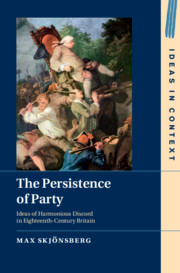Crossref Citations
This Book has been
cited by the following publications. This list is generated based on data provided by Crossref.
Binney, Matthew W.
2021.
Russia as “Pattern or Example”: John Milton’sA Brief History of Moscovia(1682).
Prose Studies,
Vol. 42,
Issue. 2,
p.
150.
Kattenberg, Lisa
2022.
Reading Lipsius in early modern Italy: Ercole Cato and the transformation of thePoliticorum Libri Sex.
History of European Ideas,
Vol. 48,
Issue. 7,
p.
1021.
Sagar, Paul
2022.
On the Liberty of the English: Adam Smith’s Reply to Montesquieu and Hume.
Political Theory,
Vol. 50,
Issue. 3,
p.
381.
Lenci, Mauro
2023.
An ancient and modern spectre: Edmund Burke and the return of democracy.
History of European Ideas,
Vol. 49,
Issue. 7,
p.
1067.
Bol, Geertje
2023.
Mary Astell on Moderation: The Case of Occasional Conformity.
The European Legacy,
Vol. 28,
Issue. 3-4,
p.
294.
Skjönsberg, Max
2023.
A Theory of the Enlightenment in Late Eighteenth-Century Sweden: Nils von Rosenstein and Scotland’s Science of Man and Politics.
Scandinavian Journal of History,
Vol. 48,
Issue. 4,
p.
427.
Skjönsberg, Max
2023.
Patriots and the Country party tradition in the eighteenth century: the critics of Britain’s fiscal-military state from Robert Harley to Catharine Macaulay.
Intellectual History Review,
Vol. 33,
Issue. 1,
p.
83.
Harris, James A.
2023.
Of the origin of government: the afterlives of Locke and Filmer in an eighteenth-century British debate.
Intellectual History Review,
Vol. 33,
Issue. 1,
p.
33.
Ahn, Doohwan
2023.
Lord Bolingbroke’s history of British foreign policy, 1492–1753.
History of European Ideas,
Vol. 49,
Issue. 6,
p.
972.
Kewes, Paulina
Gunn, Steven
Pietrzyk‐Reeves, Dorota
Seaward, Paul
Sowerby, Tracey
and
van der Meulen, Jim
2023.
Early modern parliamentary studies: Overview and new perspectives.
History Compass,
Vol. 21,
Issue. 1,
Zeng, Elena Yi-Jia
2023.
The Role of Philosophy in Hume’s Critique of Empire.
International Journal of Philosophical Studies,
Vol. 31,
Issue. 2,
p.
136.
Skjönsberg, Max
2023.
The Hume-Burke connection examined.
History of European Ideas,
Vol. 49,
Issue. 2,
p.
243.
Pincus, Steve
2023.
Confederal Union and Empire: Placing the Albany Plan (1754) in Imperial Context.
Journal of British Studies,
Vol. 62,
Issue. 3,
p.
589.
Bol, Geertje J.
2024.
Looking beyond women’s feminist thought in history.
History of European Ideas,
p.
1.
Mithen, Nicholas
2024.
‘What was moderate about the enlightenment?’ Moderation in eighteenth-century Europe.
History of European Ideas,
Vol. 50,
Issue. 6,
p.
950.
Armstrong, Madeleine
2024.
‘What they owe to their children’: Edmund Burke on parental love and liberty.
History of European Ideas,
p.
1.



